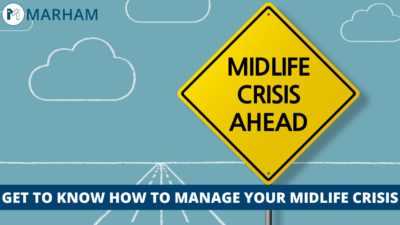Our elders often tell us to cherish our years of youth and enjoy them while they last. As time passes by, most of us are bound to look back at our ‘prime years’ and wish to go back. This realization usually comes during the 40s to 60s (give or take ten years). In this period, one looks back wistfully with a slight hint of resentment or regret of not having done enough or what they wanted to do. You may realize that your life has not turned out the way you planned it. But, what exactly is a midlife crisis?
Midlife Crisis
Not everyone is supposed to experience a midlife crisis. A midlife crisis is defined as a transition of self-identity inclined towards soul-searching. Many emotional changes come with such a time, leading to depression in a few cases. The new responsibilities and roles may overwhelm and make you question the point and purpose of your life. Your children may have graduated and got married, and you feel satisfied yet clueless. You have created an order in the chaos; now what? You may have retired early due to financial security, or your children have married off. In short, midlife can begin at any point for anyone.


Midlife Crisis Psychology
Usually, those going through a midlife crisis may question, “What is happiness?” There is no specific answer because happiness cannot be given to you; you have to create it. You don’t get happiness handed to you on a silver platter, and it has to be found in the tiniest of things. A reason behind a midlife crisis can be life without a purpose or having a temporary goal that does not fulfill you.
The actual psychology behind the midlife crisis is thinking that your life has lost purpose and meaning. It stems from three basic thought processes:
- the end of early adulthood
- reconciling polarities of self-consciousness
- reassessment of present and modifying the future goals


Signs of Midlife Crisis
Midlife crisis is different for each individual. The symptoms vary for everyone. However, pointing out the difference between midlife crisis and depression can be challenging because their symptoms overlap. If you have symptoms mentioned below, contact a psychiatrist for support. Following are some common symptoms:
- a feeling of unfulfillment in life
- intense nostalgia and recollections of the past
- feelings of emptiness and extreme boredom
- impulsive reactions
- constant thoughts about marital infidelity
- feelings of intense regret
- comparing oneself to others, who seem happy and being envious
Midlife Crisis for Women
Are you a woman who is confused and often fears losing youth? Do you keep wondering what more you can get from life? Have you achieved what you wanted? Although some midlife crisis symptoms are common, they are different for both genders. In females, the midlife crisis may appear in the form of guilt or feeling restless. They may also cry uncontrollably and have intense mood swings.


Midlife Crisis for Men
In men, midlife crisis is inclined more towards irritability and anger. They feel anxious and even have a lowered sex drive. They may also feel dissatisfied with their marriage or career or need to make a thrilling change in their lives. They may even go for an extramarital affair to feel good. Such decisions may be induced by life-changing incidents such as becoming a grandfather or losing a loved one.


How to Deal with Midlife Crisis?
Now, the real question is how to get about your midlife crisis? Following are some ways to deal with a midlife crisis:
Open Up to Someone
The package of midlife crises comes with loneliness and isolation. Men and women who feel lonely and isolate themselves must talk to a therapist about it. Staying in the shadows is not an option at all. Talking to a mental health professional allows you to create and maintain boundaries. This will help you manage your anxious thoughts and give you some space.


Don’t Make Rash Decisions
Impulsivity can prove to be a problem for you, especially when making more significant decisions. Don’t hasten your decision-making to change an aspect of your life. Always give your decisions detailed thoughts, considering those who might be impacted.


Ground your Emotions
Emotions are not always based on realities, although they are as real as the situation. However, our feelings are based on our interpretations of things. It is better to ground yourself by seeking the help of a certified psychologist.


Don’t Be Hard on Yourself
No good ever comes from being hard on yourself and even those around you. Always be compassionate and kind. If you decide on ending a relationship, try to do it decently and kindly. Remember that your decisions affect not only you but also those connected to you.


Conclusion
Moving on in life can be challenging at times, and you may feel as if you do not have any energy left to move on. As you move towards the twilight of youth, it does not mean that the Sun won’t rise again. A sunrise follows each sunset! Stay positive, and if you need any help to collect yourself, get guidance from a qualified psychiatrist in Lahore.

